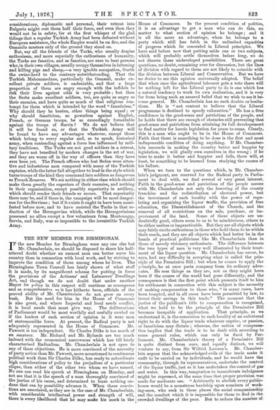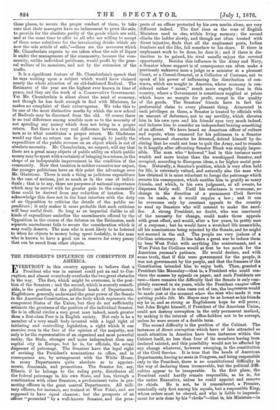THE NEW MEMBER FOR BIRMINGHAM.
Jr the new Member for Birmingham were any one else but 1 Mr. Chamberlain, we should be disposed to share his half- uttered doubt whether an earnest man can better serve his country than in connection with local work, and by striving to improve the condition of those among whpm he lives. The Birmingham Town Council has lately shown of what stuff it is made, by its magnificent scheme for putting in force the provisions of the Artisans' and Labourers' Dwellings Act, and though we do not doubt that under another Iitayor its policy in this respect will continue as courageous and as comprehensive as it has hitherto been, officials of the proved ability of Mr. Chamberlain do not grow on every bush. But the need for him in the House of Commons is also great, and where Imperial and local needs conflict, it is local needs that must give way. The deliberations of Parliament would be most worthily and usefully carried on if the leaders of each section of opinion in it were men of statesmanlike force. At present, the Radical party is not adequately represented in the House of Commons. Mr. Fawcett is too independent. Sir Charles Dilke is too much of an amateur. Mr. Richard and Mr. Rylands are too much imbued with the economical narrowness which has till lately characterised Radicalism. Mr. Chamberlain is not open to any of these objections. He is more convinced of the necessity of party action than Mr. Fawcett, more accustomed to continuous political work than Sir Charles Dilke, less ready to subordinate high considerations of policy to the prejudices of a particular chque, than either of the other two whom we have named. No one can read his speech at Birmingham on Monday, and not see that it is the speech of a man thoroughly convinced of the justice of his cause, and determined to leave nothing un- I done that can by possibility advance it. When these convic- tions are associated, as they are in the case of 'Mr. Chamberlain, with considerable intellectual power and. strength of will, ' there is every likelihood that he may make his mark in the House of Commons. In the present condition of politics, it is an advantage to get a man who can do this, no matter to what section of opinion he belongs ; and it is all the more an advantage, when he. belongs to a party which still has faith in the unlimited capacities of progress which lie concealed in Liberal principles. We have said before now that putting aside one or two subjects, which will probably settle themselves before long, we do not discern these undeveloped possibilities. There are great questions, no doubt, remaining over for discussion, but the lines of division with regard to them are not likely to coincide with the division between Liberal and Conservative. But we have no desire to see this opinion universally adopted. The belief that when once the agricultural labourer gets a vote there will be nothing left for the Liberal party to do is one which has a natural tendency to work its own realisation, and it is very far from being such an assured belief that we wish to see it be- come general. Mr. Chamberlain has no such doubts or hesita- tions. He is " not content to believe that the Liberal programme is destined to speedy exhaustion." He has a firm confidence in the good-sense and patriotism of the people, and he holds that there are enough of obstacles still preventing that good-sense and patriotism from attaining its full developement to find matter for heroic legislation for years to come. Clearly, this is a man who ought to be in the House of Commons. Faith that there is something to be done is the first and most indispensable condition of doing anything. If Mr. Chamber- lain succeeds in making the country better and happier by legislation, we will gladly own ourselves in the wrong • if he tries to make it better and happier and fails, there will, at least, be something to be learned from studying the causes a his failure.
When we turn to the questions which, in Mr. Chamber- lain's judgment, are reserved for the Radical party in Parlia- ment to deal with, we find several of very great interest. Faith in the good-sense and patriotism of the people means with Mr. Chamberlain not only the lowering of the county franchise and the redistribution of electoral power, but the investment of each locality with the power of regu- lating and organising the liquor traffic, the provision of free education, the Disestablishment of the Church, and the removal of all restrictions on the sale, purchase, or im- provement of the land. Some of these objects are un- doubtedly good, others seem to us to be mischievous, others to be either useless or impracticable. But they are all objects which may fairly excite enthusiasm in those who hold them to be within their reach, and they are all objects which had better be in the hands of practical politicians like Mr. Chamberlain than in those of merely visionary enthusiasts. The difference between the two types of men is very well illustrated by their treat- ment of the liquor question. Mr. Chamberlain has never, he says, had any difficulty in accepting what is called the prin- ciple of the Permissive Bill ; but when he comes to apply the principle, he at once parts company from its ordinary adivo-, cates. He sees things as they are, not as they might have been if the course of the world had gone differently, and the consequence is that the first point which presents itself to him for settlement in connection with this subject is the necessity of making compensation to those who, " in many cases, have been tempted, and in all cases have been permitted by law, to invest their savings in this trade." The moment that the justice of the publican's title to compensation is recognised, what we hold to be the principle of the Permissive Bill becomes incapable of application. That principle, as we understand it, is the concession to each locality of an unfettered right to do with the liquor trade whatever caprice, or passion, or fanaticism may dictate • whereas, the notion of compensa- tion implies that the trade is to be dealt with according to some general rules, which can only be fixed by Par- liament. Mr. Chamberlain's theory of a Permissive Bill is quite distinct from ours, and equally distinct, we will venture to say, from Sir Wilfrid Lawson's. Mr. Chamber- lain argues that the acknowledged evils of the trade make it unfit to be carried on by individuals, and he would have the community, through its representatives, undertake the control of the liquor traffic, just as it has undertaken the control of gas, and water. In this way, temptation to immoderate indulgence might be repressed, at the same time that proper provision was made for moderate use. "Arbitrarily to abolish every public.- house would be a monstrous hardship upon numbers of work- ing-men, who seek in these places the social companionship: and the comfort which it is impossible for them to find in the crowded dwellings of the poor. But to reduce thnnumber of, these places, to secure the proper conduct of them, to take care that their managers have no inducement to press the sale, to provide for the absolute purity of the goods which are sold, and at the same time to offer to all who are willing to accept of them some substitute for the intoxicating drinks which are now the sole article of sale,"—these are the measures which Mr. Chamberlain expects to see taken when the sale of liquor is under the management of the community, because the com- munity, unlike individual publicans, would profit by the gene- ral welfare of its members, and not by the extension of the traffic.
It is a significant feature of Mr. Chamberlain's speech that he says nothing upon a subject which would have claimed nearly the whole attention of an old-fashioned Radical. The Estimates of the year are the highest ever known in time of peace, and they are the work of a Conservative Government. Yet Mr. Chamberlain is silent about the need of economy, and though he has fault enough to find with Ministers, he makes no complaint of their extravagance. We take this to be one of the most distinctive marks by which the new school of Radicals may be discerned from the old. Of course there is no real difference among sensible men as to the necessity of not spending any money which does not bring in a proper return. But there is a very real difference between sensible men as to what constitutes a proper return. Mr. Gladstone would say that no return can be good enough to justify the expenditure of the public revenue on an object which is not of absolute necessity. Mr. Chamberlain, we suspect, will say that there are a great many objects of public utility on which public money may be spent with a certainty of bringing in a return, in the shape of an indisputable improvement in the condition of the community. Now that taxation is neither excessive nor unjust, the younger politicians have on this point the advantage over Mr. Gladstone. There is such a thing as judicious expenditure in the case of nations, just as much as in the case of indivi- duals ; that is to say, there are purposes of national importance which may be served with far greater gain to the community than could be derived from any reduction of taxation. To acknowledge this does not in the least interfere with the duty of an Opposition to criticise the details of the public ex- penditure ; it only makes it more probable that such criticism will bear useful fruit. So long as an impartial dislike to all kinds of expenditure underlies the amendments offered by the Opposition in the course of the debates on the Estimates, each separate amendment fails to secure the consideration which it way really deserve. The man who is most likely to be listened to when he objects to money being spent foolishly, is the man who is known to have a good use in reserve for every penny that can be saved from other objects.



































 Previous page
Previous page